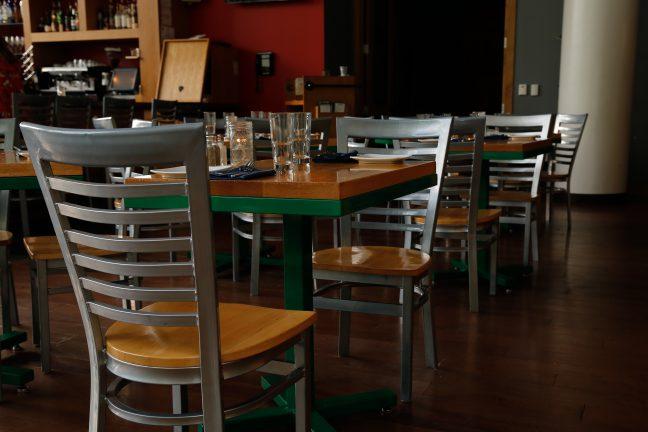Restaurants are facing challenges due to Gov. Tony Evers’ Safer at Home order, causing them to shift from full service dine-in to takeout and delivery only. In light of these challenges, there is community response to help support local businesses.
Change came quickly for Banzo restaurant owner Aaron Collins.
“The week prior [to the Safer at Home order] we saw sales start to dip,” Collins said. “When things started to get serious, when they started announcing orders, sales just plummeted, so we had to react pretty quickly.”
Though restaurants are as labeled essential businesses and are able to remain open, many in Madison are struggling with the conversion to an entirely takeout and delivery service.
Rockhound Brewing Company owner Nate Warnke shifted the business model from being a full service in-house pub to integrating EatStreet delivery service in order to handle new takeout delivery orders.
Collins experienced difficulties in changing operations of the business.
Collins said the catering business, which is a large part of business, is gone for the foreseeable future. Additionally, Collins expected to open food carts by this time in April. But now those food trucks are sitting idle.
According to Warnke, right now takeout and delivery are the only revenue sources for many restaurants, which business models are not built for. Warnke said Rockhound, whose business is designed to be a full service pub, found it hard to convert to take out. Rockhound elected to offer the takeout of beer in crowlers and growlers — portable and refillable vessels — as a way to continue those sales.
Warnke said the problem lies in the amount of real estate, utilities and insurance being paid to operate a space designed to hold crowds, that is now only being occupied by a few people. If the restaurant were designed to be takeout only, the economic hardships would not be as drastic, Warnke added.
With these economic hardships comes a huge loss of employment. Of the 701,000 jobs lost in March 2020, 60 percent of those were located in the leisure and hospitality field, mainly food services and drinking places, according to the United States Department of Labor.
This hardship for the restaurant and bar industry is just as prevalent in Madison. Collins laid off 70 percent of the Banzo staff, Collins said. Warnke gave a similar description, laying off 21 of 23 employees.
Food Fight Restaurant Group’s Director of Hospitality Elizabeth Garcia Hall, who runs the operations of 21 local Madison restaurants, spoke about the emotional difficulties faced by restaurant owners making these decisions.
“It was emotionally devastating for a lot of people. We spend so much time in the restaurant together, through the good, the bad and the ugly,” Garcia Hall said. “To have to give that news to people was heartbreaking.”
Garcia Hall said Food Fight was forced to furlough 750 restaurant employees and much of the administration office, as well as take large salary cuts. According to Collins, these lay-offs are necessary in order for their employees to have a restaurant to come back to when this over.
With the challenges faced by Madison restaurants, the community stepped in to give a helping hand.
“People are making a conscious effort to order takeout from locals,” Garcia Hall said. “That’s one of the amazing things about Madison is our restaurant culture. It’s hugely independent and home grown.”
Garcia Hall said one of the ways the community is teaming with restaurants to make a difference is through the Feed the Frontline Program.
The program allows for people to purchase 10 lunch or breakfast meal packages. The packages are distributed to hospitals and clinics, grocery stores, pharmacies, social work agencies and clinics, civil service offices, post offices, police and fire stations.
Garcia Hall said the program donated 1,200 meals in its first week of distribution, and meals are charged at a subsidized price by Food Fight as a way to give immediate hours to their employees.
Collins described a similar program Banzo and a number of other Madison local restaurants are involved in, including RockHound and Food Fight.
The Wisconsin Health Care Heroes is a program using gift card sales as a way to benefit local restaurants and healthcare workers. People can go to the organization’s website and make a donation to be used to buy $15 gift cards from local restaurants. These gift cards are distributed to healthcare workers.
“It helps the restaurant because we make gift card sales, [and] it helps the purchaser and the healthcare workers,” Collins said.
In addition to these programs, community members are doing what they can to make a difference.
Garcia Hall said there is an increase in gift card sales, as well as people trying to make efforts to visit local restaurants they otherwise would miss.
Collins described a situation about a community member who bought $150 worth of gift cards to be distributed with no name included and no questions asked.
At Rockhound, Warnke said there is an increase in tips, with some as large as 100 percent of the bill. Tips are being distributed equally among the unemployed staff.
“This Madison community is so giving, and we take care of each other,” Garcia Hall said. “People are stepping up and saying help the healthcare workers, and that’s what we can do, we can feed them.”


